Count Basie: the 100 most inspiring musicians of all time
American jazz musician William Basie, (b. Aug. 21, 1904, Red Bank, N.J., U.S.—d. April 26, 1984, Hollywood, Fla.) popularly known as “Count,” was noted for his spare, economical piano style and for his leadership of influential and widely heralded big bands.
Basie studied music with his mother and was later influenced by the Harlem pianists James P. Johnson and Fats Waller, receiving informal tutelage on the organ from the latter. He began his professional career as an accompanist on the vaudeville circuit. Stranded in Kansas City,
Mo., in 1927, Basie remained there and in 1935 assumed the leadership of a nine-piece band composed of former members of the Walter Page and Bennie Moten orchestras.
One night, while the band was broadcasting on a shortwave radio station in Kansas City, he was dubbed “Count” Basie by a radio announcer who wanted to indicate his standing in a class with aristocrats of jazz such as
Duke Ellington. Jazz critic and record producer John Hammond heard the broadcasts and promptly launched the band on its career. Though rooted in the riff style of the 1930s swing-era big bands, the Basie orchestra played
with the forceful drive and carefree swing of a small combo.
They were considered a model for ensemble rhythmic conception and tonal balance—this despite the fact that most of Basie’s sidemen in the 1930s were poor sight readers; mostly, the band relied on “head” arrangements (so called because the band had collectively composed and memorized them, rather than using sheet music).
The early Basie band was also noted for its legendary soloists and outstanding rhythm section. It featured such jazzmen as tenor saxophonists Lester Young and Herschel Evans, trumpeters Buck Clayton and Harry “Sweets” Edison, and trombonists Benny Morton and Dicky Wells. The legendary Billie Holiday was a vocalist with Basie for a short stint (1937–38), although she was unable to record with the band because of her contract with another record label; mostly, vocals were handled by Jimmy Rushing. The rhythm unit for the band—pianist Basie, guitarist Freddie Green (who joined the Basie band in 1937 and stayed for 50
years), bassist Walter Page, and drummer Jo Jones—was unique in its lightness, precision, and relaxation, becoming the precursor for modern jazz accompanying styles.
Basie began his career as a stride pianist, reflecting the influence of Johnson and Waller, but the style most strongly associated with him was characterized by spareness and precision. Whereas other pianists were noted for technical flash and dazzling dexterity, Basie was known for his use of silence and for reducing his solo passages to the minimum amount of notes required for maximum emotional and rhythmic effect.
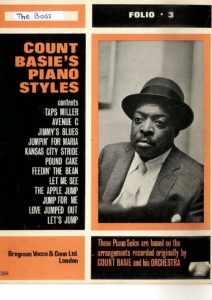
The Basie orchestra had several hit recordings during the late 1930s and early ’40s, among them “Jumpin’ at the Woodside,” “Every Tub,” “Lester Leaps In,” “Super Chief,” “Taxi War Dance,” “Miss Thing,” “Shorty George,” and “One O’Clock Jump,” the band’s biggest hit and theme song. It had continued success throughout the war years, but, like all big bands, it had declined in popularity by the end of the 1940s.
During 1950 and ’51, economy forced Basie to front an octet, the only period in his career in which he did not lead a big band. In 1952 increased demand for personal appearances allowed Basie to form a new orchestra that in many ways was as highly praised as his bands of the 1930s and ’40s. (Fans distinguish the two major eras in Basie bands as the “Old Testament” and “New Testament.”)
Browse in the Library:
| Artist or Composer / Score name | Cover | List of Contents |
|---|---|---|
| Astor Piazzola Oblivion Guitar Arr. By Nadja Kossinskaja |
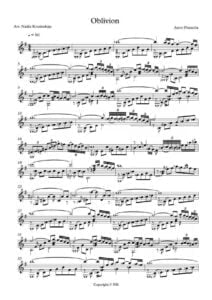 |
Piazzola Oblivion Guitar arr. by Nadja Kossinskaja page 1-1 |
| Astor Piazzolla 12 Tangos Piano |
 |
|
| Astor Piazzolla 6 Tangos |
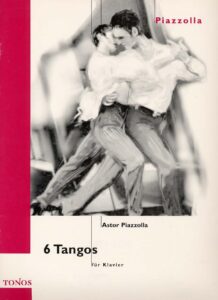 |
Astor Piazzolla 6 Tangos |
| Astor Piazzolla Angel (Complete) For Piano (Different Version) |
 |
Astor Piazzolla Angel (Complete) For Piano (Different Version) |
| Astor Piazzolla Ave Maria (Piano) |
 |
|
| Astor Piazzolla Balada Para Un Loco (Cacho Tirao) Guitar |
 |
|
| Astor Piazzolla Maria De Buenos Aires, Opera Tango (Partitura completa) |
 |
|
| Astor Piazzolla Milonga Del Angel (Piano Solo) Arranged By Prof. John Mortensen Slow Tango |
 |
|
| Astor Piazzolla Milonga Del Angel (Piano Solo) Original |
 |
|
| Astor Piazzolla sheet music Le Grand Tango Score For Viola And Piano |
 |
|
| Astor Piazzolla Vuelvo al sur (piano) |
 |
|
| Astor Piazzolla – 5 piezas para guitarra (guitar sheet music) | Astor Piazzolla – 5 piezas para guitarra (guitar sheet music) | |
| Astor Piazzolla – Picasso (Tango) Piano |
 |
|
| Astor Piazzolla 4 Estaciones Porteñas Guitar arr. |
 |
|
| Astor Piazzolla Nightclub 1960 Duo Flute Guitar |
 |
|
| Astor Piazzolla – Adios Nonino (Two Pianos) | Astor Piazzolla – Adios Nonino (Two Pianos) | |
| Astor Piazzolla – Adiós Nonino (guitar sheet music) |
 |
|
| Astor Piazzolla – Adios Nonino Piano Solo |
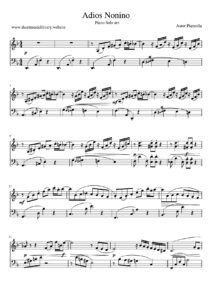 |
|
| Astor Piazzolla – Album No. 1 |
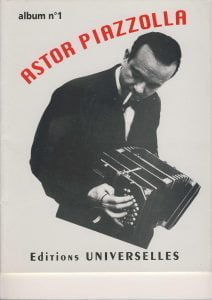 |
Astor Piazzolla album no 1 |
| Astor Piazzolla – Album No. 2 |
 |
Astor Piazzolla – Album No. 2 |
| Astor Piazzolla – Album No. 4 |
 |
Astor Piazzolla – Album No. 4 |
| Astor Piazzolla – Buenos Aires Hora Cero | Astor Piazzolla – Buenos Aires Hora Cero | |
| Astor Piazzolla – Chau Paris (piano) | Astor Piazzolla – Chau Paris (piano) | |
| Astor Piazzolla – Complete Works – Obras Para Piano Y Varios Instrumentos (partituras, sheet music) | Astor Piazzolla – Complete Works – Obras Para Piano Y Varios Instrumentos (partituras, sheet music) | |
| Astor Piazzolla – Contrastes (Piano) | Astor Piazzolla – Contrastes (Piano) | |
| Astor Piazzolla – Coral (Piano) | Astor Piazzolla – Coral (Piano) | |
| Astor Piazzolla – Estaciones Porteñas for piano – für Klavier |
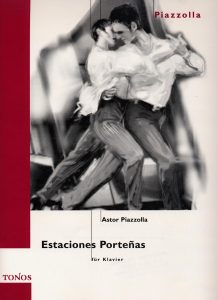 |
Astor Piazzolla – Estaciones Portenas fur Klavier |
| Astor Piazzolla – Fuga 9 (Piano) | Astor Piazzolla – Fuga 9 (Piano) | |
| Astor Piazzolla – Invierno Porteno (guitar sheet music) |
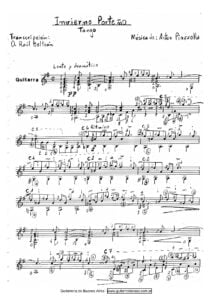 |
|
| Astor Piazzolla – Invierno porteño [clarinet-piano] |
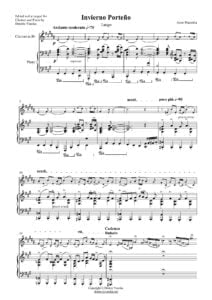 |
|
| Astor Piazzolla – La Muerte Del Angel (Guitar arr. sheet music) |
 |
|
| Astor Piazzolla – Libertango (Part A – Guitar Arr.) (Musescore File).mscz | ||
| Astor Piazzolla – Libertango for 2 pianos | Astor Piazzolla – Libertango 2KL | |
| Astor Piazzolla – Los pajaros perdidos (canción) piano vocal |
 |
|
| Astor Piazzolla – Milonga Del Angel (guitar arr. sheet music) |
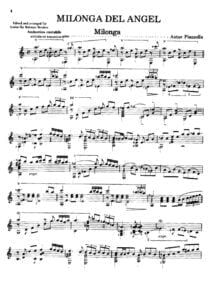 |
|
| Astor Piazzolla – Milonga del angel (Piano solo) |
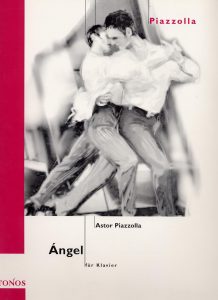 |
Astor Piazzolla – Milonga del angel |
| Astor Piazzolla – Oblivion (piano solo ver.) | Astor Piazzolla – Oblivion (piano solo sheet music) | |
| Astor Piazzolla – Oblivion (piano solo) |
 |
|
| Astor Piazzolla – Oblivion arr. by Najda Kssinskaja (Guitar arr. sheet music with TABs) | Astor Piazzolla – Oblivion arr. by Najda Kssinskaja (Guitar arr. sheet music with TABs) | |
| Astor Piazzolla – Oblivion Cello & piano | Piazzolla Oblivion cello piano arr. | |
| Astor Piazzolla – Oblivion for Piano solo sheet music (partitura) |
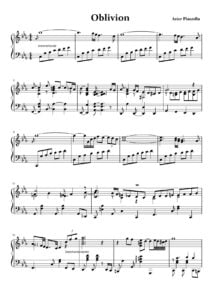 |
|
| Astor Piazzolla – Onda Nueve (Tango) Piano | Astor Piazzolla – Onda Nueve (Tango) Piano | |
| Astor Piazzolla – Otoño Porteño (guitar sheet music) | Astor Piazzolla – Otoño Porteño (guitar sheet music) | |
| Astor Piazzolla – Piano SongBook (Angel, Libertango, 6 Tangos, Estaciones Porteñas) |
 |
|
| Astor Piazzolla – Preludio 9 (Piano) | Astor Piazzolla – Preludio 9 (Piano) | |
| Astor Piazzolla – Río Sena (Tango) Piano | Astor Piazzolla – Río Sena (Tango) Piano | |
| Astor Piazzolla – Romanza del Duende (Piano) | Astor Piazzolla – Romanza del Duende (Piano) | |
| Astor Piazzolla – sheet music – Suite del Angel (Piano) |
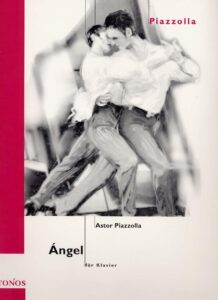 |
|
| Astor Piazzolla – Soledad (Solitude) Full score sheet music | Astor Piazzolla – Soledad (Solitude) Full score sheet music (first page) | |
| Astor Piazzolla – Suite Troileana 2 guitars (Bandoneon, Zita, Whisky, Escolaso) |
 |
|
| Astor Piazzolla – Suite Troileana 2 guitars arr. Sergio Assad (Bandoneon, Zita, Whisky, Escolaso) |
 |
|
| Astor Piazzolla – Suite Troileana arr for Piano (Bandoneon, Zita, Whisky, Escolaso) |
 |
|
| Astor Piazzolla – Tangos for 2 Pianos |
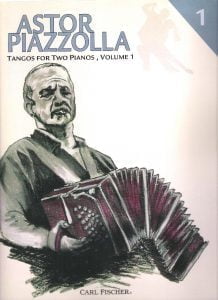 |
Astor Piazzolla – Tangos for 2 Pianos |
| Astor Piazzolla – Tangus Dei (Piano) |
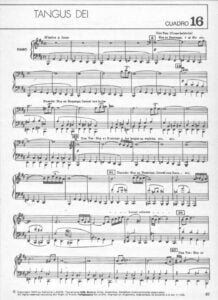 |
|
| Astor Piazzolla – The Last Tango Music Of Guitar arr. |
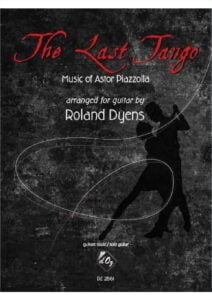 |
|
| Astor Piazzolla – Tristango (Piano) | Astor Piazzolla – Tristango (Piano) | |
| Astor Piazzolla – Vuelvo Al Sur (10 tangos and other pieces arr. piano) |
 |
Astor Piazzolla – Vuelvo Al Sur |
| Astor Piazzolla -Four, For Tango – Score |
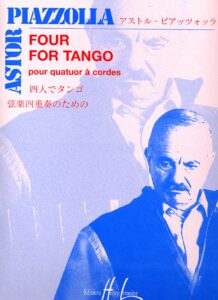 |
|
| Astor Piazzolla (Spanish Español Ed. 2018 El Ateneo 2020) (María Susana Azzi) Biography Book |
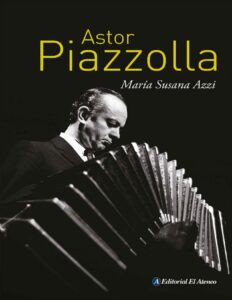 |
|
| Astor Piazzolla (Tango) Balada Para Un Loco – Guitar (letra Horacio Ferrer) |
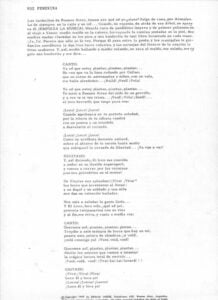 |
|
| Astor Piazzolla 100 Años Edicion Aniversario Sus mejores obras para piano |
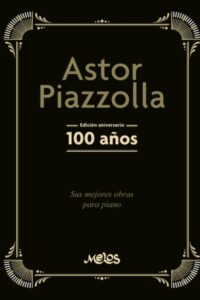 |
Astor Piazzolla 100 Años Edicion Aniversario Sus mejore obras para piano |
| Astor Piazzolla 25 Tangos for Clarinet and piano Clarinet Part in Bb |
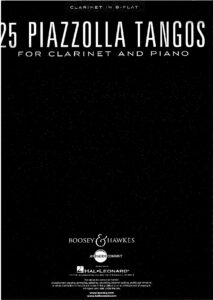 |
Astor Piazzolla 25 Tangos for Clarinet and piano Clarinet Part in Bb |
| Astor Piazzolla 28 tangos arranged For Piano |
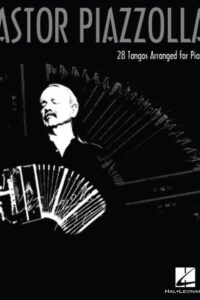 |
Astor Piazzolla 28 tangos arranged For Piano |
| Astor Piazzolla Album 20 compositions arr. for Piano |
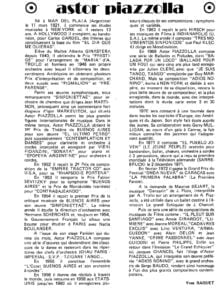 |
Piazzolla album |
| Astor Piazzolla Ave Maria (Piano and voice) |
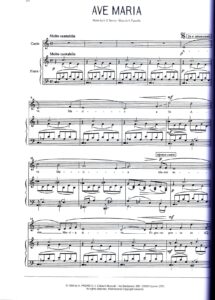 |
|
| Astor Piazzolla Cinco Piezas For Guitar |
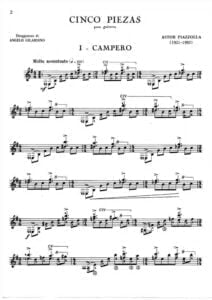 |
|
| Astor Piazzolla Color de Buenos Aires Suite letra Horacio Ferrer |
 |
|
| Astor Piazzolla Contrabajeando Double Bass And Piano Contrabajo Y Piano |
 |
|
| Astor Piazzolla Extasis Piano (Tango) |
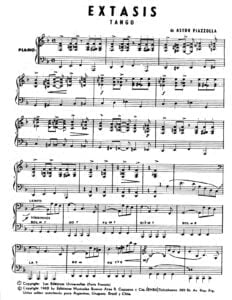 |
|
| Astor Piazzolla Flute or Violin Piano Collection |
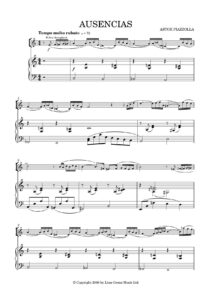 |
|
| Astor Piazzolla For Violin And Guitar (Astor Piazzolla) |
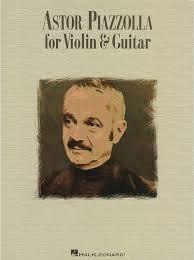 |
Astor Piazzolla For Violin And Guitar (Astor Piazzolla)_compressed |
| Astor Piazzolla Guitar compositions Collection (Guitarra) sheet music, partituras | Astor Piazzolla Guitar compositions (Guitarra) sheet music, partituras | |
| Astor Piazzolla Horacio Ferrer Chiquilin De Bachin Piano vocal |
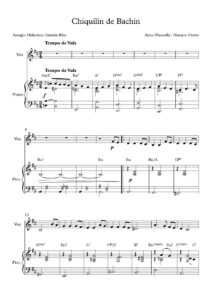 |
|
| Astor Piazzolla La Muerte Del Angel Trio Violin Cello Piano Score |
 |
|
| Astor Piazzolla Le Grand Tango – Two Pianos | Astor Piazzolla Le Gran Tango – Two Pianos | |
| Astor Piazzolla Libertango (Guitar Solo Arr.) With Tab |
 |
|
| Astor Piazzolla Milonga Del Àngel (For Chamber Orchestra) Tangos |
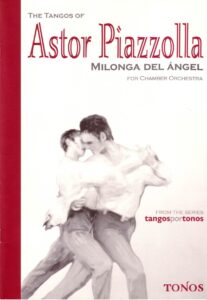 |
|
| Astor Piazzolla Oblivion (piano solo) |
 |
|
| Astor Piazzolla Oblivion arr. for 2 violins |
 |
|
| Astor Piazzolla Oblivion for Violin or Flute Cello Piano | Astor Piazzolla Oblivion for Violin or Flute Cello Piano | |
| Astor Piazzolla Oblivion Trans Solo Piano | Astor Piazzolla Oblivion Trans Solo Piano sheet music pdf | |
| Astor Piazzolla Oblivion Violin Guitar |
 |
|
| Astor Piazzolla Obras Completas Guitarra For Guitar |
 |
Astor Piazzolla Obras Completas For Guitar |
| Astor Piazzolla Piano Collection |
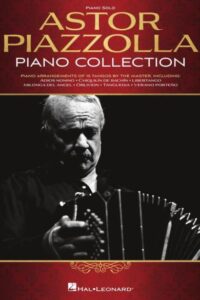 |
Astor Piazzolla Piano Collection |
| Astor Piazzolla Piano Meditango |
 |
|
| Astor Piazzolla Romance Del Diablo Flauta Violin and Piano |
 |
|
| Astor Piazzolla Sensuel Piano |
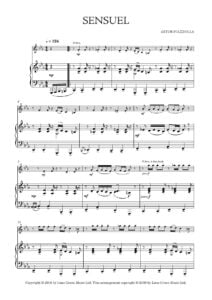 |
|
| Astor Piazzolla Tangazo for Orchestra Variaciones sobre Buenos Aires para orquestra |
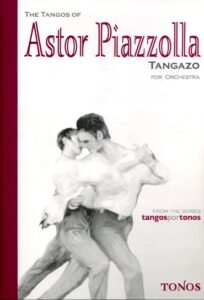 |
|
| Astor Piazzolla Tango Etudes (for flute or Violin) | Astor Piazzolla Tango Etudes (for flute or Violin) | |
| Astor Piazzolla Tango S V P For Violin Ensemble Solo | Astor Piazzolla Tango S V P For Violin Ensemble Solo | |
| Astor Piazzolla Tangos Arr Phillip Keveren The Phillip Keveren Series Piano Solo |
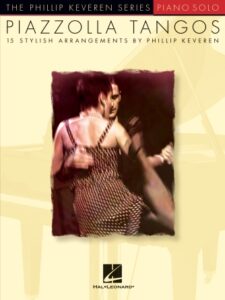 |
Astor Piazzolla Tangos Arr Phillip Keveren The Phillip Keveren Series Piano Solo |
| Astor Piazzolla Tanti Anni Prima Ave Maria For Piano solo |
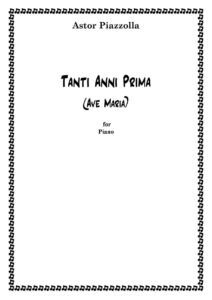 |
|
| Astor Piazzolla Tanti Anni Prima Ave Maria Violin and Piano |
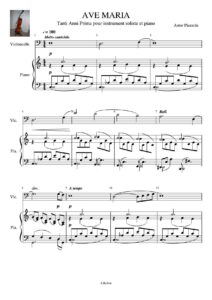 |
|
| Astor Piazzolla Vuelvo Al Sur Flute or Violin and Piano | Astor Piazzolla Vuelvo Al Sur Flute or Violin and Piano | |
| Astor Piazzolla y Anibal Troilo- Contrabajeando (Tango) Piano | Astor Piazzolla y Anibal Troilo- Contrabajeando (Tango) Piano | |
| Atlantic Starr – Always | ||
| Atomic Kitten – The Tide Is High | ||
| Atomic The Musical By Philip Foxman And Danny Ginges Piano Vocal Score |
 |
|
| Atonement – Dario Marianelli (For Piano) |
 |
Atonement – Dario Marianelli (For Piano) |
| Au Clair De La Lune – Traditional (Musescore File).mscz | ||
| Audioslave Out Of Exile Guitar TABs |
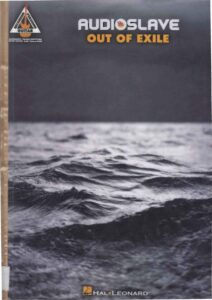 |
Audioslave Out Of Exile Guitar TABs |
| Audition (The Fools who Dream) La La Land OST | ||
| Audra Mcdonald Build A Bridge (Songbook) (Audra Mcdonald) Piano Vocal Guitar chords |
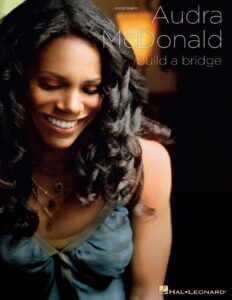 |
Audra Mcdonald Build A Bridge (Songbook) (Audra Mcdonald) Piano Vocal Guitar chords |
| Augustana – Boston | ||
| Aura Lee (intermediate great jazz arrangement) G. Poulton | Aura Lee Jazz | |
| Aura Lee By G. Poulton Jazz Arrangement.mxl | ||
| Aura Lee G. Poulton (Easy version ) | Aura Lee Easy version | |
| Aura Lee Jazz (Musescore File).mscz | ||
| AURORA Conqueror Piano Solo arr. |
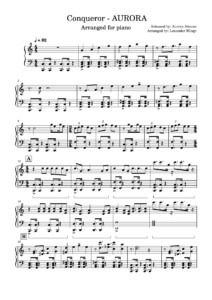 |
|
| AURORA Running With The Wolves |
 |
|
| Aurora – Cure For Me |
 |
|
| AURORA Forgotten Love Piano with lyrics |
 |
|
| AURORA Half The World Away Sheet Music Piano Vocal Guitar chords |
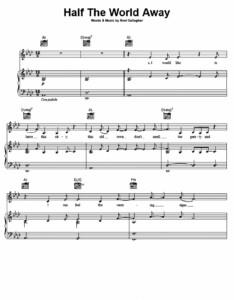 |
|
| AURORA Into The Unknown from Disney’s Frozen |
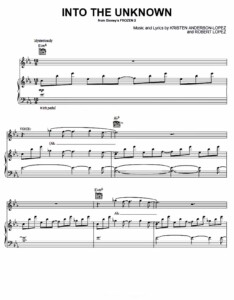 |
|
| AURORA It Happened Quiet Piano Solo arr. |
 |
|
| AURORA Runaway Piano Vocal guitar Chords |
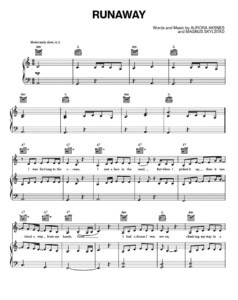 |
|
| AURORA Songbook Sheet Music Anthology Collection | AURORA Songbook Sheet Music Anthology Collection | |
| AURORA The River Aurora Piano Solo arr. |
 |
|
| Automatic Harmonic Analysis of Jazz Chord Progressions Using a Musical Categorial Grammar (Mark Wilding) | Automatic Harmonic | |
| Autour Du Jazz Guitar 4 pièces pour guitare (Thierry Tisserand) |
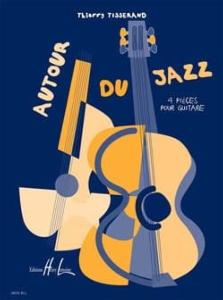 |
Autour Du Jazz Guitar 4 pièces pour guitare (Thierry Tisserand) Contents — autour du jazz |
The Basie orchestra of the 1950s was a slick, professional unit that was expert at sight reading demanding arrangements. Outstanding soloists such as tenor saxophonists Lucky Thompson, Paul Quinichette, and Eddie “Lockjaw” Davis and trumpeters Clark Terry and Charlie Shavers, figured
prominently. Singer Joe Williams, whose authoritative, bluesinfluenced
vocals can be heard on hit recordings such as “Every Day I Have the Blues” and “Alright, Okay, You Win,” was also a major component in the band’s success. Arrangers Neal Hefti, Buster Harding, and Ernie Wilkins defined the new band’s sound on recordings such as “Li’l Darlin’,”
“The Kid from Red Bank,” “Cute,” and “April in Paris” and on celebrated albums such as The Atomic Mr. Basie (1957).
The 1950s band showcased the sound and style Basie was to employ for the remainder of his career, although there were to be occasional—and successful—experiments such as Afrique (1970), an album of African rhythms and avant-garde compositions that still managed to remain faithful to the overall Basie sound.
Throughout the 1960s, Basie’s recordings were often unremarkable, but he remained an exceptional concert performer and made fine records with singers Ella Fitzgerald, Sarah Vaughan, and Frank Sinatra. When jazz record producer Norman Granz formed his Pablo label in the 1970s, several established jazz artists, including Basie, signed on in order to record unfettered by commercial demands. Basie benefited greatly from his association with Granz and made several recordings during the ’70s that rank among his best work.
He recorded less often with his big band during this era (although when he did, the results were outstanding), concentrating instead on small-group and piano-duet recordings. Especially noteworthy were the albums featuring the duo of Basie and Oscar Peterson, with Basie’s economy and Peterson’s dexterous virtuosity proving an effective study in contrasts. Many of Basie’s albums of the ’70s were Grammy Award winners or nominees.
Suffering from diabetes and chronic arthritis during his later years, Basie continued to front his big band until a month before his death in 1984. The band itself carried on into the next century, with Thad Jones, Frank Foster, and Grover Mitchell each assuming leadership for various intervals. Basie’s autobiography, Good Morning Blues, written with Albert Murray, was published posthumously in 1985. Along with Duke Ellington, Count Basie is regarded as one of the two most important and influential bandleaders in the history of jazz.
Best site for sheet music download.
Count Basie and his Orchestra live at the North Sea Jazz Festival • 13-07-1979 • World of Jazz
The Orchestra: • Count Basie: piano • John Clayton, bass • Butch Miles, drums • Freddie Green, guitar, • Sonny Cohn, Pete Minger, Ray Brown, Paul Cohen, trumpet • Bill Hughes, Mel Wanzo, Mitchell Wood Jr, Dennis Wilson, trombone • Eric Dixon, Charlie Fowlkes, Kenny Hing, Bobby Plater, Danny Turner, saxophone • Dennis Rowland, vocals
The repertoire: Wind Machine Shiny Stockings John The III There Will Never Be Another You Good Time Blues April In Paris I Can’t Get Started In A Mellotone Easy Living 9.20 Special Good Mileage Splanky Recorded on 17 July 1979 at the Congresgebouw, The Hague, the Netherlands by AVRO TV
